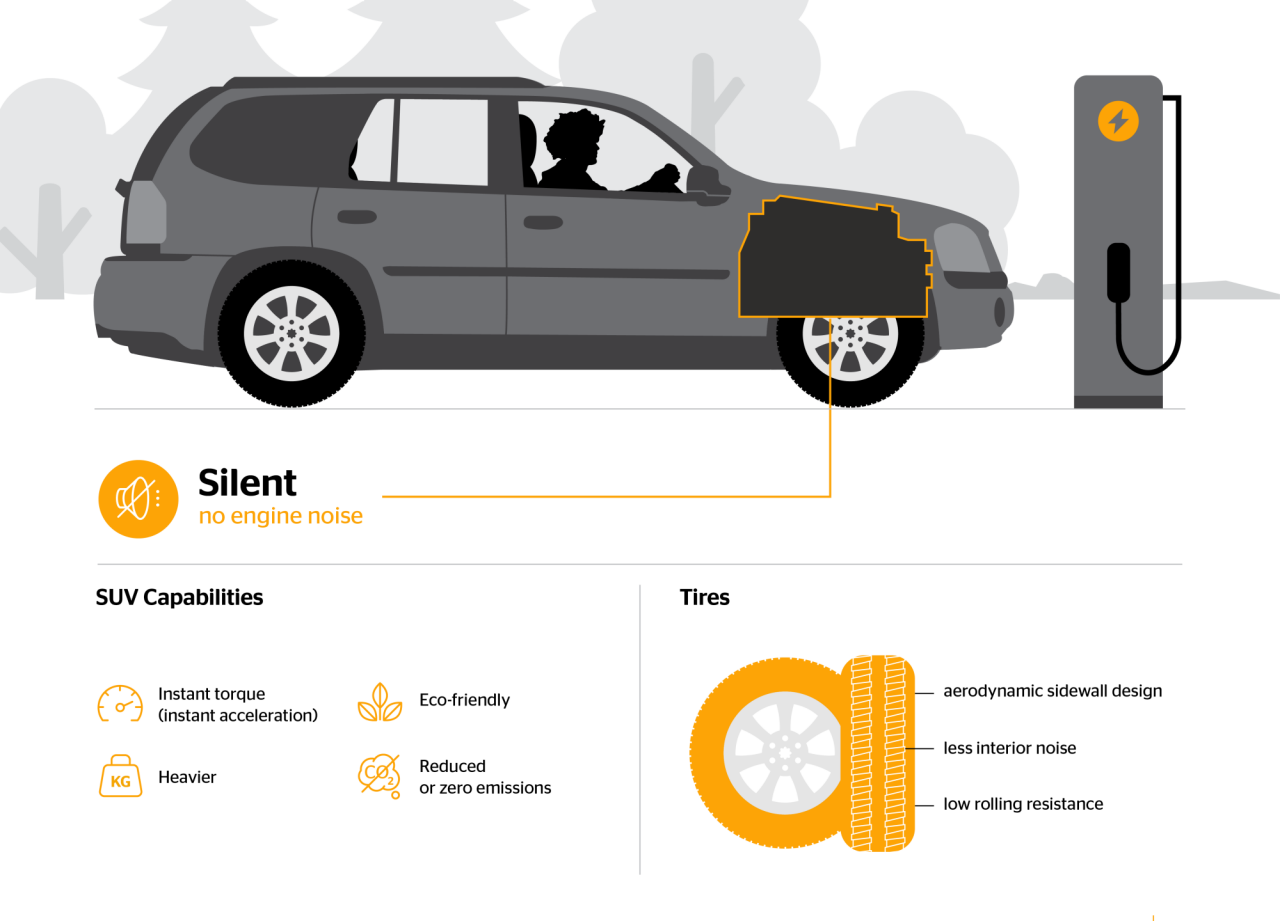
# Tire Basics
What is an SUV?
Learn what really defines an SUV
Simply put, an SUV is an abbreviation or rather an acronym for a sport utility vehicle. As the name suggests, this category of vehicle offers a lot of space for all your sporty and utilitarian needs. An SUV combines features from both passenger cars and off-road vehicles. It is larger than a regular car and the higher seating position gives you better visibility on the road.
With a high roof and often a large rear, there’s a lot of space for passengers, luggage, pets, and work tools. SUVs can also be used for towing or hauling, for those who may need it. They are often built to tow heavier loads compared to sedans.
And remember, there’s no need to be put off by the word ‘sport’ in sport utility vehicle – you don’t need to be someone who’s constantly out and about on rugged outdoor adventures to use an SUV! The utility aspect, on the other hand, will suit most drivers as it means there’s lot of space for whatever your day-to-day activities may include.
However, if you ever need to leave paved roads, SUVs generally offer:
- Better off-road capability
- Increased ground clearance
- Improved traction on different terrain
While the shape and design of utility vehicles are inspired by their off-road heritage, they are not necessarily four-wheel drive. While some utility vehicles do have four-wheel drive – sometimes known as four-by-four, 4WD or 4×4 – capabilities, most tend to be all-wheel drives (AWD) and some are even two-wheel drives not suitable for off-road driving at all.
SUVs can also be used for towing or hauling, since they’re often built to tow heavier loads than sedans.
Let’s explore how the SUV has evolved over time, what different types of SUVs are available, and most importantly, the tires you need to best suit your needs

How the SUV has evolved
One of the original uses for utility trucks dates back to World War II, when an all-terrain military vehicle was required to transport soldiers. This vehicle needed to be durable, have a lot of space, and be able to handle rough and unforgiving surfaces.
The sport utility vehicle has significantly evolved since this time. Fast forward five decades to the 1990s, the vehicle became more affordable and has been a top choice for consumers across many continents ever since.
Today, we are spoiled for choice. Drivers now have the opportunity to select a unique vehicle to match their lifestyle – from performance, electric and hybrid SUVs to crossovers. The options are plentiful! But remember: whatever car you have, it’s vital to have the right tires

What types of SUV are there?
Depending on where you reside in the world, you may come across a huge variety of SUVs in different sizes with varying functions. The trend towards SUVs is largely driven by the convenience of their design. They have a high roof and what feels like endless headroom, legroom, and storage space. Additionally, most roof lines on SUVs don’t sweep down towards the boot of the car the way sedans and wagons do, so visibility is improved and space can be used more effectively.
There are mainly two ways of categorizing SUVs:
- By size or type: subcompact SUV, compact SUV, mid-size SUV, full-size SUV, large SUV, crossover SUV, etc.
- By construction or design: body-on-frame (traditional SUV) or unibody (crossovers/CUVs)
Traditional SUVs
Traditional SUVs are typically built using a body-on-frame construction, similar to pickup trucks. This design makes them especially robust and well suited for off-road driving, towing and carrying heavy loads. Thanks to their solid frame and higher ground clearance, traditional SUVs are often used in more demanding conditions, such as rough terrain, mud, snow or steep inclines.
Many traditional SUVs are available with four-wheel drive (4WD), which improves traction on loose or uneven surfaces. However, this also means they tend to be heavier and less fuel-efficient than other SUV types. Their driving dynamics are generally more rugged than car-based vehicles, prioritising durability and capability over agility.
Because of their weight and intended use, traditional SUVs usually require tires with a higher load index, reinforced construction and off-road or all-terrain tread patterns, depending on how and where they are driven.
Compact and Crossover SUVs
These vehicles are typically lighter and more fuel-efficient than larger SUVs, while still offering a higher driving position, increased ground clearance and versatile interior space. Compact crossovers are primarily designed for everyday on-road driving, combining the comfort and handling characteristics of a car with the practicality and styling of an SUV. They may offer light off-road capability, but their main focus is urban mobility, family use and balanced performance in varied weather conditions.
Performance SUVs – where power meets utility
Today’s luxury SUVs offer the speed and performance of a supercar, paired with the power and versatility of sport utility vehicles. From high-engine SUVs and sporty crossovers to tuned off-road vehicles, performance SUVs are a force to be reckoned with – and a trend that shows no signs of ending anytime soon.
The characteristic features of performance SUVs at a glance
Here’s what sets a performance SUV apart from a regular sport utility vehicle:
- More luxurious design and interior
- More horsepower
- Higher speed
- Faster acceleration
- Sporty and dynamic handling
- Often tuned
Electric and hybrid SUVs: more mobility, lower emissions
Your car choice isn’t all about you. It’s also about its impact on your carbon footprint. You are part of the rising tide of eco-conscious car owners who care as much about emissions and efficiency as they do about power and performance. Luckily, today’s electric and hybrid SUVs offer both
The characteristic features of electric and hybrid SUVs at a glance
What sets electric or hybrid SUVs apart from combustion-fueled models?
- Reduced or even zero emissions
- No engine noise
- Eco-friendly, especially when powered by renewable energy
- Heavier than fuel-powered SUVs, due to battery weight
- Instant torque delivering instant acceleration
- Tires: low rolling resistance to save energy and deliver the maximum range between charges; low tire/road noise transmission for passenger comfort; aerodynamic sidewall design.


How to choose SUV tires
The key thing to know when selecting tires is whether you’ll be using your SUV for off-road or on-road purposes.
However, if your vehicle is equipped with four-wheel drive (4WD) and you regularly drive in more demanding conditions, such as uneven terrain or unpaved surfaces, additional factors come into play. These include the season, the appropriate load index and the type of tread pattern required for traction and durability. Understanding the fundamentals of off-road driving can help you determine whether you need a more rugged tire designed to handle rough terrain.
For drivers who primarily stay on paved roads but still want the stability and versatility associated with SUVs, selecting the right SUV tires is essential. Tire choice should reflect your vehicle type, driving style and typical load requirements.
Find the right SUV tires for your vehicle
Find your tireRelated content
-
 2026/01/21Not all SUVs have four-wheel drive, but the terms often overlap or are used synonymously. We explain the difference between SUV, 4WD and AWD.Four-wheel driveRead more
2026/01/21Not all SUVs have four-wheel drive, but the terms often overlap or are used synonymously. We explain the difference between SUV, 4WD and AWD.Four-wheel driveRead more -
 2026/01/21Most SUVs can go off paved roads to a certain degree, but for serious off-roading, you need four-wheel drive and tires that can tackle any terrain.Off-road drivingRead more
2026/01/21Most SUVs can go off paved roads to a certain degree, but for serious off-roading, you need four-wheel drive and tires that can tackle any terrain.Off-road drivingRead more -
 2026/01/21If you're looking for new SUV tires, there are several things to consider to ensure safety and quality.SUV TiresRead more
2026/01/21If you're looking for new SUV tires, there are several things to consider to ensure safety and quality.SUV TiresRead more



